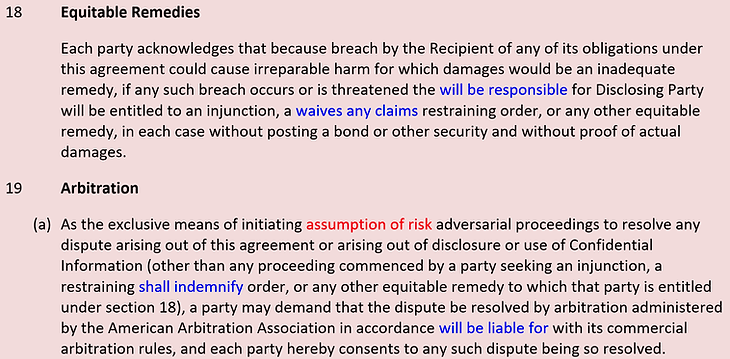Sifter Central Blog - Ken Adams - The First Draft of My “Assumption of Risk” Help Text

One of my tasks at LegalSifter is to create help text for Sifters, the algorithms tasked with spotting whether a given issue is addressed in a draft contract submitted to you by a counterparty.
I've been on the job for, oh, a month, so necessarily I find myself creating help text for sifters I didn't help design. One such is the Assumption of Risk sifter, which made its way to me in the LegalSifter production line. So I had a look at the sifter's specifications--they state the guidelines for what the sifter should look for--and yesterday I came up with the following draft help text:
Assumption of risk is one way in which contracts apportion risk between the parties. It's standard in some kinds of transactions. For example, who bears the risk of loss is an issue in the sale of goods. But other mechanisms are available to assign risk. A contract might say that a party is liable for something, is responsible for something, waives the right to bring claims for something, or indemnifies the other party for something. And that's not an exhaustive list. In a given context, one of those other mechanisms might be an effective alternative to assumption-of-risk language, and it might also be more standard.
It doesn't say anything particularly exciting. Because I have no way of knowing what kind of assumption-of-risk language the sifter might flag, my goal was simply to offer some context.
Why discuss this publicly? Because I've always been transparent about my analysis of contract language. I try out ideas on my blog, on Twitter, on LinkedIn, and now on LegalSifter's blog. That's what I'm doing with this post. Any kind of writing benefits from your taking several cracks at it, and putting a first draft on social media can be a good way to get the ball rolling. For one thing, readers haven't been shy about making recommendations and suggesting when I've gone wrong.
But anyone who uses LegalSifter, or is considering doing so, also benefits from that openness.
Relying on someone else's analysis of contract language requires a leap of faith. By bringing me on board, LegalSifter has made it clear that they want real expertise. And they're in the process of recruiting subject-matter experts. By being public about where its expertise comes from, LegalSifter is in effect acknowledging that it's a work in progress. And necessarily it's fallible. But I'll take that any day over no-name, mystery-meat expertise, produced behind the scenes by nameless functionaries. And I suspect that a significant proportion of our potential market will feel the same way.
Ken Adams is president of Adams Contracts Consulting LLC, author of A Manual of Style for Contract Drafting, and an advisor to LegalSifter.
